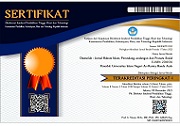CITATIONS
KONSEP HARTA DAN KEPEMILIKANNYA MENURUT HUKUM ISLAM
Abstract
Property is a primary need for humans to support life in this world, so as to carry out worship to Allah swt well. Nevertheless, the Qur'an warns that property must be obtained in a desired manner of Islamic law, and are used in places that have goodness according to Islamic law required. A principle developed by Islamic law to the problem of property is the rules do not set definitely in the Quran and Hadis, but the general principles are put forward, which must be followed by everyone who tried to get the property. islamic law requires in acquiring and managing property to note of the following principles; 1) property acquired and owned is not of the type that is unclean and dangerous to humans; 2) the way to obtain the property is done by humane methods, such as buying and selling is done by the parties by not deceive one another, bless one another and be honest when covenant; 3) as the party who has the authority to carry out property, Islamic law mentioned basic requirements that need to be considered, namely a maximum adult age (minimum 18 years) and has a ruysd (smart) characteristic, that is the ability to carry out property in accordance with the rule of Islamic law. By following all the things that have been mentioned, then property can be valued provides benefit to humans, both in keeping religion or maintaining the human body and soul (mukallaf).
Keywords
property, ownership, Islamic law.
Full Text:
PDFReferences
Abdul Azis Dahlan, Ensiklopedi hukum Islam, jilid 2 dan 3 , Jakarta: Ichtiar Baru Van Hoeve, 1996
Abbas Mahmud al-Aqqad, Filsafat Qur’an, terj. Tim Pustaka Firdaus, Jakarta: Pustaka Firdau, 1996
Abi Ubaid al-Qasim bin Salam, Kitab al-Amwal, Bayrut: Dar al-Fikr, 1988
Badwi ‘Abdu al-Lathif, al-Nidzam al-mal al-Islam al-Muqaran, t.t. 1972
Fathurrahman Djamil, Filsafat Hukum Islam, Jakarta: Logos Wacana Ilmu, 1997
Ghufron A. Mas’adi, Fiqh Muamalah Kontekstual, Jakarta: RajaGrafindo Persada,2002
H.A. Djazuli, Fiqh Siyasah, Jakarta:Kencana, 2003
Hasbi Ash-Shiddieqy, Filsafat Hukum Islam, Semarang: Pustaka Rizki Putra, 2001
Hendi Suhendi, Fiqh Muamalah, Jakarta: RajaGrafindo Persada, 2002
Husein Syahata, Ekonomi Rumah Tangga Muslim, Jakarta: Gema Insani Press, 1998
Isma’il Muhammad Syah, dkk.Filsafat Hukum Islam, Jakarta: Bumi Aksara, 1999
Juhaya S. Praja, Filsafat Hukum Islam, Bandung: LPPM Universitas Islam Bandung, 2004
Jaih Mubarok, Kaidah Fiqh, Jakarta: RajaGrafindo Persada, 2002
Lili Rasyidi dan Ira Thania Rasyidi, Dasar-dasar Filsafat dan Teori Hukum, Bandung, Citra Adiya bakti, 2004
Muhammad Muslehuddin, Filsafat Hukum Islam dan Pemikiran Orientalis, terj. Yudian
Suparman Usman, Hukum Perwakafan di Indonesia, Jakarta: darul Ulum Press, 1994
UU no. 5/1960 tentang Pengaturan Dasar Pokok-pokok Agraria
Wahyudi Asmin,Yogyakarta; Tiara Wacana Yogya, 1991.
Yusuf Qaradhawi, Hukum Zakat, terj. Didin Hafidhuddin, Jakarta: Litera Antar Nusa, 2004
DOI: http://dx.doi.org/10.22373/dusturiyah.v8i2.4220
Refbacks
- There are currently no refbacks.
Copyright (c) 2018 Irwansyah
Indexed by:
Tools:
All papers published in Dusturiyah: Jurnal Hukum Islam, Perundang-undangan dan Pranata Sosial are licensed under a Creative Commons Attribution-ShareAlike 4.0 International License. |
Office address: Fakultas Syariah dan Hukum Universitas Islam Negeri Ar-Raniry. Jl. Ar-Raniry, Kopelma Darussalam, Syiah Kuala, Banda Aceh, Aceh, Indonesia 23111. Email: jurnal.dusturiyah@ar-raniry.ac.id
situs toto slot gacor slot gacor situs toto















